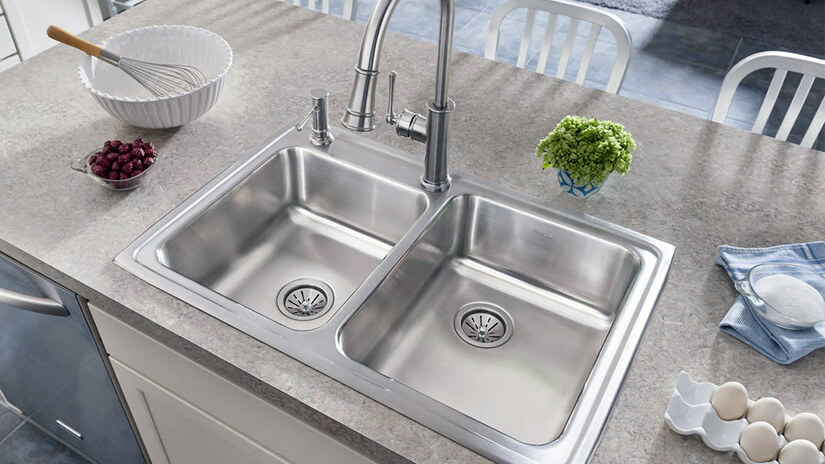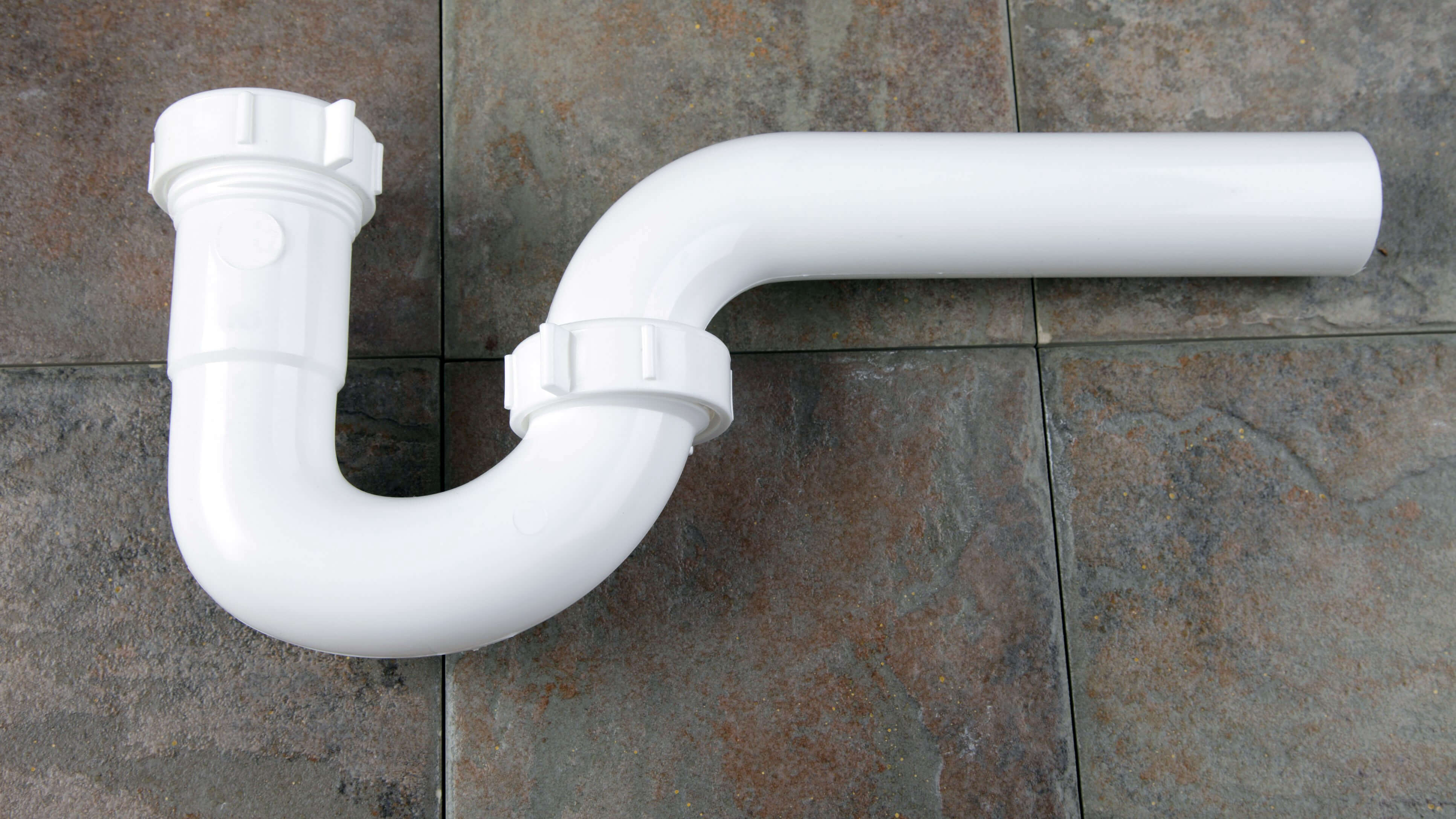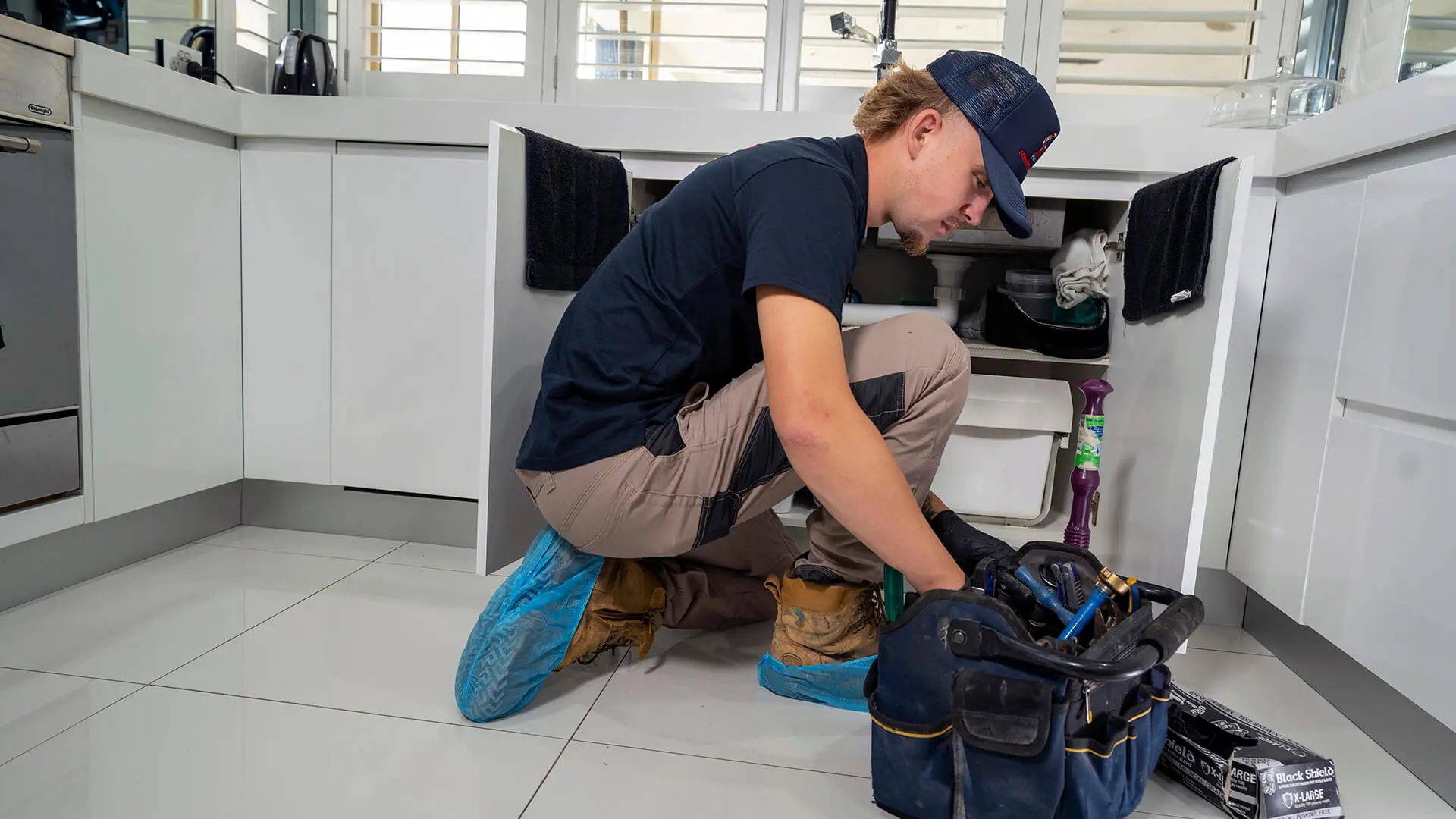Have you noticed that your kitchen sink isn’t draining quickly, or is water just sitting in your sink? Is there a nasty smell wafting up from it? It sounds like you’ve got a clog in your drain. A blocked kitchen sink can mess with your home’s plumbing in several ways.

If your kitchen sink isn’t up to scratch, you risk pipe damage, water overflow, surface damage, an unhygienic home, and even flooding. Given how often we use our sinks every day, it’s a huge hassle when things go wrong.
Why Is The Water In My Sink Not Going Down?
There are a few reasons you could be experiencing a clogged sink or drain or sink draining slowly. Fat and grease build-up, soap scum, stuck food items, or oil accumulation are only a few reasons why your drain or drain trap can clog up. These items will not let the water or gas pass through easily, and the obstructed movement will create a gurgling sound and slow draining sink.
If your clogged drain is untreated, your sink will not clear out completely, or water will slowly move down the drain. Due to the drain blockage, the wastewater can flow back from the pipes, leading to a malfunctioning sink. Below are more common reasons for sink blockages, clogged drains, or your sink won’t drain.
Food Scraps
Coffee grounds, food waste, and more can get stuck in your drain. Sometimes, when washing dishes and clearing up after a meal, you may inadvertently wash bits of food down the sink. Over time, the food can sit in the pipe and become lodged. Old food items will begin to rot, and you will find a foul smell coming out of the pipes. The food may be too solid or extensive to go down the water channels.
Invest in a sink strainer that covers the drain opening. It will catch pieces of food you can dispose of in your garbage.
Oil
Cooking oil and fats like bacon grease are bad for your pipework. Once the oil has cooled, it can solidify and lodge onto the pipelining. This will slow the flow of water as the passageway becomes narrow. Even though it seems easier to drain old cooking oil or coffee grounds down your sink, it is a bad idea and will cause more harm to your plumbing.
To handle fats and oils correctly, you can pour the leftovers into a garbage disposal or bag and dispose of the bag in your outside bin.
Foreign Objects
The plumbing at your property can only handle water, human waste and toilet paper. Anything that gets flushed down can cause an obstruction and blockage and may be stuck in the channels. This can be done unintentionally and without you realising it.
When using your kitchen drain, keeping your pipework protected from material that can damage the pipes and cause clogs is essential. Only pouring water down the drain and installing a strainer will catch household items such as toys and jewellery.
How Do You Unclog A Kitchen Sink?
You can find cleaning solutions in stores that break down dirt and clear clogged pipes. But, if you decide to use them, make sure to handle with care and read the instructions thoroughly. These chemicals not only pose health risks but can also corrode your pipes, potentially leading to bigger problems and costs—certainly a road you’d rather avoid.
When your sink’s not draining, you need to act fast. Luckily, there are some ways to unclog it using just household items.
Plunger
This method is straightforward and requires just a few steps. Grab a strong toilet plunger or a drain/plumber’s snake with a flat head. Make a snug seal over the drain opening with the plunger, hold the handle firmly, and use a push-and-pull motion. The pressure from quick movements should dislodge the blockage. You might need to repeat this a few times to clear it completely.
Wire Coat Hanger
You can untwist an ordinary wire coat hanger and straighten it out. On one end, manipulate the wire to make a handle. Make sure you keep the other end straight. Insert the straight back into the drain opening and twist clockwise. This should push the obstruction down the line.
Vinegar And Baking Soda
A natural alternative to chemical drain cleaners is a mixture of baking soda and vinegar with equal parts of boiling water. However, it’s best to skip this step if you’ve got PVC pipes because hot water could loosen the pipe seals.
Flush the drain with half a cup or 1 cup of baking soda, followed by 1 cup of white vinegar or apple cider vinegar. Let the mixture sit for 15 minutes. Next, carefully pour 1 cup of boiling water down the drain. Repeat the process if necessary for stubborn blockages. The combined baking soda and vinegar will create a chemical reaction that breaks down solid fat and oils in your drain pipe and drain clogs, clearing your blocked sink.
P Trap
The P Trap, that p-shaped pipe under your sink, catches debris and stops sewer odours from wafting up. If possible, remove the P Trap and check for blockages. Make sure you wear rubber gloves and have a bucket ready to catch any water.
Clean the trap out thoroughly and reattach it back to the pipework.

Is the Sink Still Not Draining?
We have reviewed a few methods, such as hot water, vinegar, baking soda down the drain, wire coat hangers, and even a plunger. But if these remedies don’t work and you still have a clogged sink in your kitchen—or if it is not blocked entirely but only slow-draining—you may need to call a plumber.
A licensed plumber will have the experience and proper tools, such as a high-pressure jet blaster, a plumber’s snake and CCTV cameras to inspect your pipes and find the cause of the clog. The aim is to unclog a kitchen sink and find a permanent solution so you do not have drain problems in the future.
If you want to save time and yourself from dealing with your plumbing problems alone, call an experienced plumber to help you.















